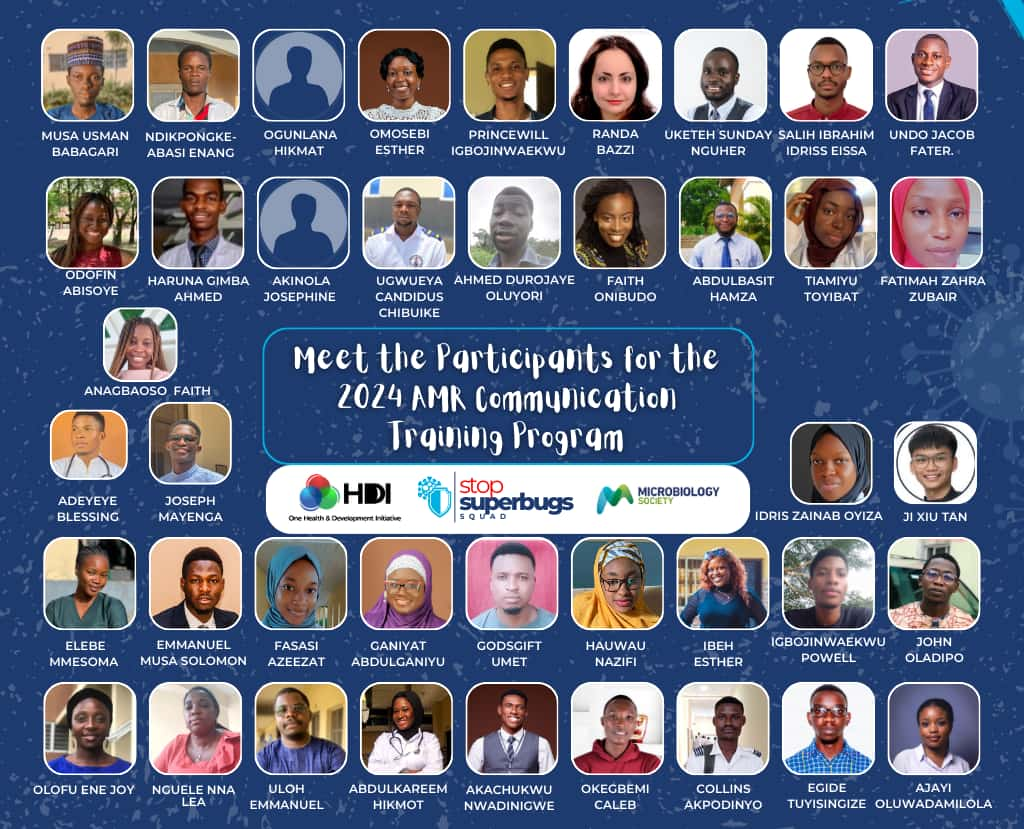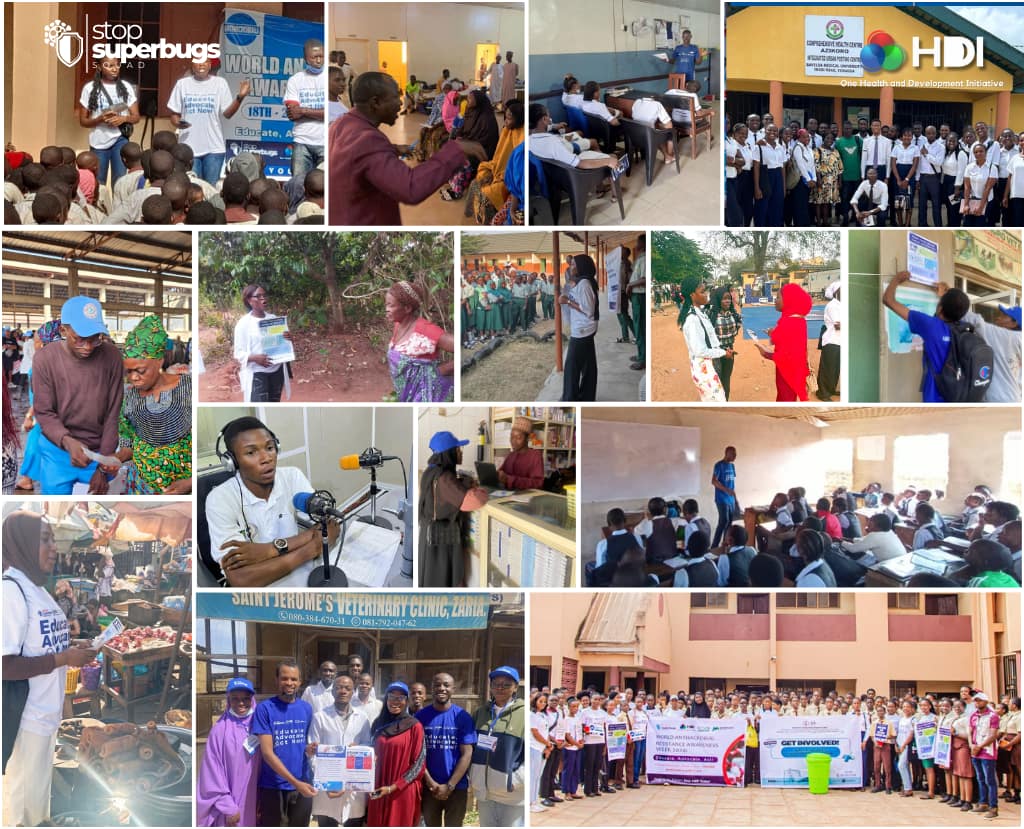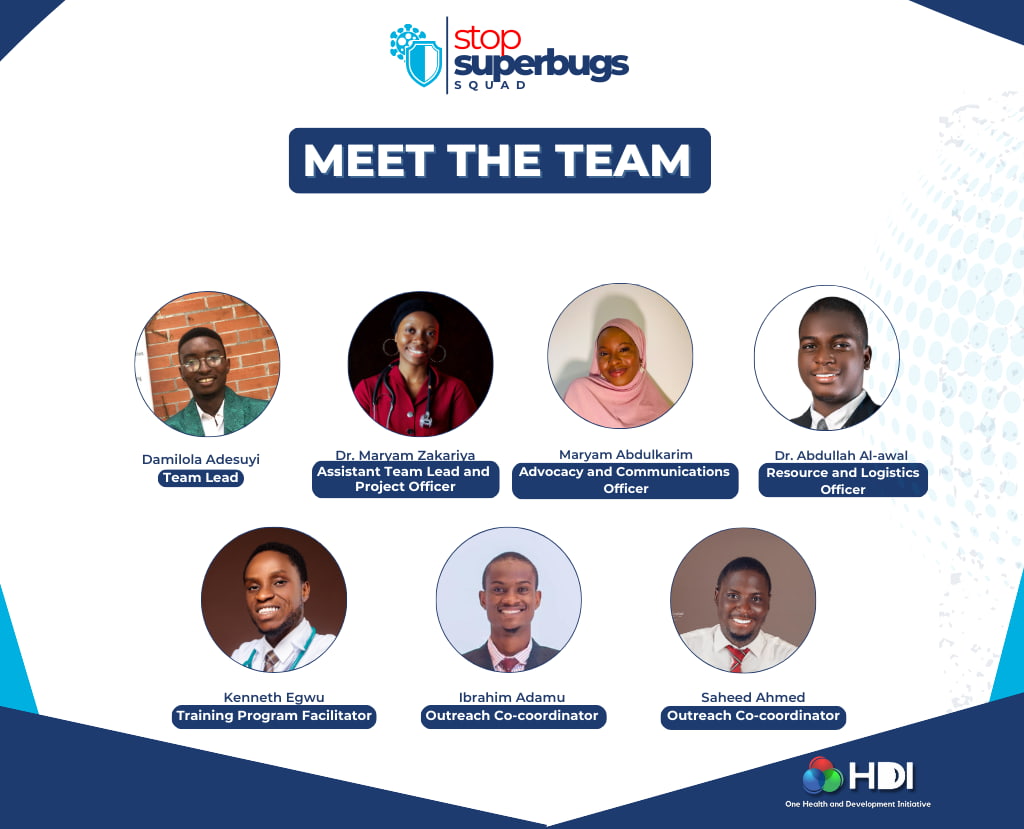
Antimicrobial resistance (AMR) is a growing public health crisis, with an estimated 327,000 deaths in Nigeria alone in 2019, greater than deaths from enteric and respiratory infections, tuberculosis, maternal and neonatal disorders, NTDs, and cardiovascular diseases. As a threat that knows no borders, AMR affects all sectors of society, from healthcare to agriculture, with no regard for age groups. In fact, 20% of those AMR-related deaths occurred among children below the age of five. As such, the urgent need for proactive education, awareness, and action has never been more apparent. This was the driving force behind the launch of the African Youths for AMR Communication program by the One Health and Development Initiative through the Stop Superbug Squad project.
African Youths for AMR Communication: A vision for change
The goal of this project is simple yet profound: to empower the next generation of AMR advocates and antimicrobial stewards. We are supporting them through comprehensive training on risk communication and community engagement. Additionally, we are providing technical support for their youth-led initiatives focused on AMR mitigation and responsible antimicrobial use. As the World Antimicrobial Awareness Week (WAAW) unfolded in 2024, these champions carried the AMR message far and wide, armed with knowledge, passion, and resources.
From training to action
The call for youth champions resulted in an overwhelming response across Africa and beyond. With 108 applications from 65 universities spanning 14 countries, 41 youth champions were selected from Nigeria, Cameroon, Rwanda, Tanzania, and Malaysia for the first phase of the project. The champions were selected for their enthusiasm, commitment to AMR advocacy, and ability to mobilize their communities.

Consequently, these champions underwent rigorous training in AMR communication, gaining insights into effective risk communication strategies, the role of One Health in AMR prevention, and the importance of community engagement. Sessions on gender and AMR, digital media advocacy, and policy dialogue equipped them with the tools to foster change in their respective regions.
One of the most innovative aspects of this training was its “train-the-trainer” approach, which encouraged champions to pass on the knowledge to other young people in their student chapters or AMR clubs. In total, these youth leaders trained 362 volunteers, reaching over 7.6 million people through various activities, including AMR dialogues, social media campaigns, webinars, and radio broadcasts. The champions also engaged over 28,000 people face-to-face, with many pledging to take action against AMR.
Impact at the grassroots level
The champions’ efforts resulted in numerous impacts that demonstrate the power of grassroots education. In Ibadan, Oyo State, one of the champions was able to change the behaviour of a pharmacist during an outreach. A woman walked into the pharmacy seeking antibiotics without a prescription, but the pharmacist, having been sensitized during the campaign, asked her critical questions about her health issue and the necessity of the medication. This moment was a perfect example of how educating healthcare providers can help curb improper antimicrobial use.
In Malete, Kwara State, a school principal pledged to ensure that AMR education would be sustained. Not only did the school commit to continuing the conversation about AMR with its students, but it also committed to installing hand-washing stations to promote hygiene and prevent infections, a vital move in AMR prevention.
In communities like Yola, Adamawa State, and Ilorin, Kwara State, district and village heads pledged to spread the AMR message among their people. In Gado Nasko, Abuja, more than 20 community pharmacies committed to promoting AMR awareness, marking another critical milestone in the fight against resistance.
These stories are just a glimpse of the impact achieved during WAAW 2024 through the African Youths for AMR Communication project. Each interaction, pledge, and new commitment contributed to increased awareness and action that promises to promote improved AMR stewardship in communities.

Phase Two: WASH off AMR Campaign
While the first phase of the project achieved remarkable success, this is only the beginning. Phase two, funded by The Trinity Challenge, will engage 40 Nigerian undergraduates who will be trained to deliver sustainable AMR education in 80 secondary schools across Nigeria’s six geopolitical zones. This next phase promises to amplify the impact of the project, expanding its reach to an even younger demographic and fostering long-term awareness about the dangers of antimicrobial misuse.
Expectations are high as we prepare to roll out this new phase. The energy, passion, and commitment displayed by the first cohort of youth champions have set the stage for an even more widespread and impactful movement. This phase will strengthen AMR education and introduce innovative solutions tailored to the specific needs of secondary school students and the wider community.
Spotlight on the Stop Superbug Squad Team
At the heart of the Stop Superbug Squad is its passionate and driven team, empowering other youths to be antimicrobial stewards and AMR advocates. Their dedication and drive are a true testament to the power of youth in creating meaningful change. Meet these passionate young professionals.
- Damilola Adesuyi – Damilola Adesuyi is a public health microbiologist working to address AMR and zoonosis via the One Health approach through behavioural science, risk communication, and research. He’s a Public Health Program Officer at OHDI and a Tsuha Global Fellow.
- Dr. Maryam Zakariya – Dr. Maryam Zakariya is a veterinarian and a public health enthusiast who is currently pursuing a master’s in Global Health and Infectious Diseases at the University of Edinburgh. She is the current president of the International Student One Health Alliance (ISOHA), and her interests lie in zoonotic infectious diseases and global health.
- Maryam Abdulkarim – Maryam is a dedicated microbiologist and a passionate public health enthusiast. A recent MSc graduate in Antimicrobial Resistance from the University of Sheffield, she currently works as a Research Technician specializing in Bacterial Biofilm Assays at the Microbial Physics Lab. As the Advocacy Lead for AfricaPHSN, she drives impactful youth-focused campaigns and initiatives to raise awareness and strengthen public health capacity across African countries.
- Dr. Abdullah Al-awal – Dr. Abdullah Al-Awal is a public health veterinarian with interests in using the One Health approach to address infectious diseases, food safety issues, and AMR. He currently works as a Program Officer at OHDI. He also serves as the Vice-chairman (NWG) at AfricaPHSN.
- Kenneth Egwu – Kenneth Egwu is a global health Pharmacist and researcher committed to addressing AMR, especially in resource-constrained countries. He is the co-founder of the AMR Intervarsity Training Program, a member of the British Society for Antimicrobial Chemotherapy (BSAC), and a recipient of many grants aimed at advancing efforts towards containing AMR. In 2024, he received the prestigious Diana Award for his advocacy work.
- Ibrahim Adamu – Ibrahim Adamu is a microbiologist and co-founder of the AMR Intervarsity Training Program. His interests revolve around preventing the emergence and spread of infections, including antimicrobial resistance (AMR), through grassroots interventions such as education and policy advocacy.
- Saheed Ahmed – Saheed Ahmed is a final-year veterinary medical student at the University of Ibadan, Nigeria, with a focus on infectious diseases research. He is a passionate advocate for public health and raising awareness of antimicrobial resistance (AMR). Dedicated to promoting interprofessional collaborations, he works to advance One Health initiatives to tackle global health challenges.

In all our efforts, we acknowledge the support of the Microbiology Society and South Centre, and the ongoing dedication of the team members. With the second phase just around the corner, and the anticipation is palpable, stay tuned as we continue to champion the cause of AMR awareness, empowering the African youths in the fight against this global health threat. Together, we will stop the superbugs!





